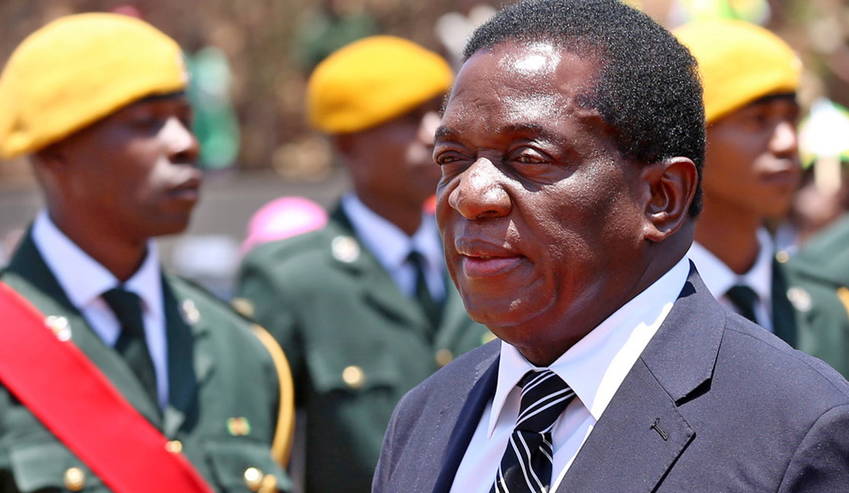Once branded as the breadbasket of Africa, Zimbabwe was last Wednesday on 15 November 2017; put under political tension after its Military leaders seized control of the country in an apparent coup, deploying tanks in the capital city of Harare and placing 93-year-old President Robert Mugabe under house arrest. In a national televised address, the military spokesperson Major General Sibosiso Moyo, said the seizure was to “pacify a degenerating social and economic situation”, as well as targeting criminals around Mugabe.
Reactions from regional and international parties relating to the crisis have emerged with African Union (AU) naming the crisis as ‘seems like a coup’ urging the military to halt their actions and restore the constitutional order. The UN Secretary – General Antonio Gutierres called on all sides in Zimbabwe to show “restraint” and appealed for calm and non-violence. UK Foreign Secretary, Boris Johnson made a statement to the House of Commons on unfolding crisis saying; “We cannot tell how developments in Zimbabwe will play out in the days ahead and we do not know whether this marks the downfall of Mugabe or not, and we call for calm and restraint.” He added that Britain has only ever wanted self-determination for the Zimbabwean people, while Mugabe has subverted democracy and harmed the country’s economy. He further said: “We will never forget the strong ties of history and friendship with that beautiful country; accurately described as the jewel of Africa.” He called for free and fair elections to be held as scheduled next year and said that UK would work to ensure they offer Zimbabweans a “genuine opportunity … to decide their future”.
On last Friday on 17 November 2017, Zimbabweans woke up to uncertainty after President Mugabe refused to step down. Quite a number of factors have led to the political turmoil:
The worsening economic situation since the country’s GDP per capita dropped by 40%, agricultural output dropped by 51% and industrial production dropped by 47%. Mugabe’s government has been slammed with this situation.
Tensions in the ruling ZANU–PF party between former Vice-President Emerson Mnangagwa (who was backed by the army) and First Lady Grace Mugabe (who was backed by the younger G40 political faction) over who would succeed the aging Mugabe. The sacking of Mr. Mnangagwa in early November is believed by many as a motive to the current situation. He was accused of plotting to oust President Robert Mugabe. The ruling Zanu-PF party on November 14 accused the army chief of “treasonable conduct” after he challenged Mugabe over the sacking of Mnangagwa. The action created a widespread discontent among Mnangagwa’s supporters and exposed deep factional divides within ZANU-PF party ranks.
There are has been a long-running battle between the war veterans – old political elite forged in 1970s and 1980s and new political generation that has coalesced around Grace Mugabe. In recent years, Robert Mugabe has been systematically dismissing veterans of the liberation struggle from party posts in recent years. The war veterans broke ranks with the Mugabe in 2016 and have vowed to form a broad front with the opposition to challenge his rule. Chris Mutsvangwa, the head of the war veterans’ group, told reporters in Johannesburg last week that Grace Mugabe was “a mad woman” who had won power through a “coup … by marriage certificate”.
It appears that the military coup is intending not to impose a military rule instead to put pressure on ailing Mugabe to leave the office. As some media reports it is likely a transitional government will be formed in the wake of the coup.
It appears that Mugabe’s days in power are numbered as statements and efforts to intervene the situation reflect. Since UK controls both political class and the army she now wants to dispose his agent Mugabe whom he once elevated him to a revolutionist to bringing in another agent through ‘democratic election’. The UK is using its regional agents and bodies such as president Zuma of South Africa, South African Development Community (SADC) and African Union (AU) to at least put the ‘right person’ in charge. Already President Zuma has sent special envoys who met President Robert Mugabe and the Zimbabwean Defense Force.
More significantly the coup has so far hijacked the peoples’ emotions yearning for change in their country. It is painful to see Zimbabweans from all walks of life have been made to believe the country’s’ future is bright and the removal of the aging dictator will salvage them! The people of Zimbabwe ought to know the modern military takeover is just a colonial powers’ style of refurbishing their rotten filth ideology of capitalism as well trying to give lifeline to the corrupt political system of Democracy. In Africa, the colonial powers use military coup to dump in their own agents who once before they elevated them only to bring new agents. Clearly the change of leadership with same capitalist economic approach won’t bring any fundamental change.
Shaban Mwalimu
Media Representative Hizb ut Tahrir in Kenya
Written for Ar-Rayah Newspaper – Issue 157

